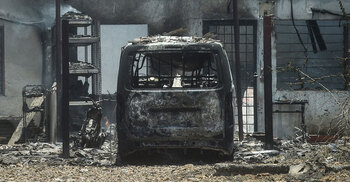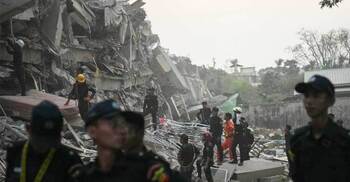Man pulled alive from Myanmar quake rubble after 5 days

A man was pulled alive from the rubble of a Myanmar hotel on Wednesday, officials said, five days after a devastating earthquake hit the country, killing more than 2,700 people.
The 26-year-old was freed by a joint team of Myanmar and Turkish rescuers from the ruins of the building in the capital Naypyidaw around 12:30 am (1800 GMT on Tuesday), the fire service and the country's ruling junta said.
Survivors of the earthquake have pleaded for more aid as the death toll continues to rise, and calls for the junta to halt its attacks on rebels have intensified amid the ongoing crisis.
The shallow 7.7-magnitude earthquake, which struck on Friday, flattened buildings across Myanmar, killing more than 2,800 people and leaving thousands homeless.
Several leading armed groups fighting the government have suspended hostilities during the quake recovery, but junta chief Min Aung Hlaing said military operations would continue -- despite international criticism of multiple reported air strikes.
UN agencies, rights groups and foreign governments have urged all sides in Myanmar's civil war to stop fighting and focus on helping those affected by the quake, the biggest to hit the country in decades.
AFP journalists saw chaotic scenes as at least 200 desperate people lined up for aid distribution in Sagaing, the city closest to the epicentre of the quake, some running through traffic to join the queues.
Destruction in the city is widespread, with the World Health Organization (WHO) reporting that one in three houses have collapsed, and five days after the quake locals complained of a lack of help.
"Of course we don't have enough," said Ayethi Kar, 63, head of a school for young nuns razed to the ground by the tremors.
"Now we eat donated food and water but we sleep on the ground."
Healthcare facilities, damaged by the quake and with limited capacity, are "overwhelmed by a large number of patients", while supplies of food, water and medicine are running low, WHO said in its latest update, issued on Tuesday.
Hopes of finding more survivors are fading, but there were moments of joy on Wednesday as two men were pulled alive from the ruins of a hotel in the capital Naypyidaw.
Call for peace
The junta said Wednesday that the death toll had risen to 2,886, with more than 4,600 injured and 373 still missing.
But with patchy communication and infrastructure delaying efforts to gather information and deliver aid, the full scale of the disaster has yet to become clear, and the toll is likely to rise.
Relief groups say the overall quake response has been hindered by continued fighting between the junta and the complex patchwork of armed groups opposed to its rule, which began after the military seized power in a 2021 coup.
Julie Bishop, the UN special envoy on Myanmar, called on all sides to "focus their efforts on the protection of civilians, including aid workers, and the delivery of life-saving assistance".
Even before Friday's earthquake, 3.5 million people were displaced by the fighting, many of them at risk of hunger, according to the United Nations.
Late Tuesday, an alliance of three of Myanmar's most powerful ethnic minority armed groups announced a one-month pause in hostilities to support humanitarian efforts in response to the quake.
The announcement by the Three Brotherhood Alliance followed a separate partial ceasefire called by the People's Defence Force -- civilian groups that took up arms after the coup to fight junta rule.
But there have been multiple reports of junta air strikes against rebel groups since the quake.
"We are aware that some ethnic armed groups are currently not engaged in combat, but are organising and training to carry out attacks," said junta leader Min Aung Hlaing, mentioning sabotage against the electricity supply.
"Since such activities constitute attacks, the Tatmadaw (armed forces) will continue to carry out necessary defensive activities," he said in a statement late Tuesday.
A junta spokesman said soldiers fired warning shots on Tuesday when a Chinese Red Cross convoy failed to stop while approaching a village in conflict-ridden Shan state to deliver aid to earthquake victims.
The UN special rapporteur on human rights in Myanmar, Tom Andrews, rejected the junta's characterisation of its operations.
"Senior General Min Aung Hlaing has described ongoing junta attacks in the midst of Myanmar's suffering as 'necessary protective measures'," he wrote on X.
"They are neither necessary nor protective. They are outrageous and should be condemned in the strongest possible terms by world leaders."
Source: AFP







